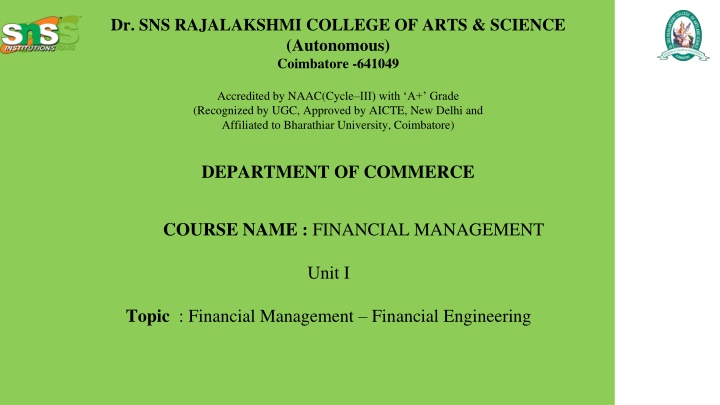
Advanced Financial Management and Engineering at Dr. SNS Rajalakshmi College
Explore Financial Management and Financial Engineering at Dr. SNS Rajalakshmi College of Arts & Science in Coimbatore. Learn about the application areas, techniques, tools, and benefits in optimizing financial decision-making. Join Ms. V. Keerthana to delve into risk management, capital structure optimization, portfolio management, and corporate finance using mathematical models and computational strategies.
Download Presentation

Please find below an Image/Link to download the presentation.
The content on the website is provided AS IS for your information and personal use only. It may not be sold, licensed, or shared on other websites without obtaining consent from the author. If you encounter any issues during the download, it is possible that the publisher has removed the file from their server.
You are allowed to download the files provided on this website for personal or commercial use, subject to the condition that they are used lawfully. All files are the property of their respective owners.
The content on the website is provided AS IS for your information and personal use only. It may not be sold, licensed, or shared on other websites without obtaining consent from the author.
E N D
Presentation Transcript
Dr. SNS RAJALAKSHMI COLLEGE OF ARTS & SCIENCE (Autonomous) Coimbatore -641049 Accredited by NAAC(Cycle III) with A+ Grade (Recognized by UGC, Approved by AICTE, New Delhi and Affiliated to Bharathiar University, Coimbatore) DEPARTMENT OF COMMERCE COURSE NAME : FINANCIAL MANAGEMENT Unit I Topic : Financial Management Financial Engineering
FINANCIAL MANAGEMENT Financial Management is the process of planning, organizing, directing, and controlling the financial resources of an organization to achieve its goals efficiently. It focuses on utilizing financial resources to maximize profitability, ensure liquidity, and create long-term value for stakeholders. Financial management applies to all types of organizations businesses, governments, and non-profits as well as personal finances. Ms. V Keerthana Dr SNSRCAS
FINANCIAL ENGINEERING Financial Engineering refers to the application of mathematical tools, statistical techniques, and computational models to solve complex financial problems and design innovative financial products. It integrates disciplines such as finance, economics, mathematics, statistics, and computer science to optimize financial decision-making. Ms. V Keerthana Dr SNSRCAS
FINANCIAL ENGINEERING APPLICATION AREAS 1.Risk Management 1.Designing derivatives like options, futures, and swaps to hedge against market volatility. 2.Building quantitative risk models to assess and mitigate credit, operational, and market risks. 2.Capital Structure Optimization 1.Using mathematical models to determine optimal debt-to-equity ratios. 2.Scenario analysis and simulations for funding decisions. 3.Portfolio Management 1.Creating investment portfolios using quantitative optimization techniques such as the Markowitz Model or Black-Litterman Model. 2.Applying stochastic processes to predict asset price movements. 4.Corporate Finance 1.Valuing financial instruments, assets, and projects using techniques like Monte Carlo simulations and real options. 2.Structuring innovative financing methods (e.g., securitization). Ms. V Keerthana Dr SNSRCAS
FINANCIAL ENGINEERING TECHNIQUES AND TOOLS Mathematical Models Time series analysis for forecasting financial trends. Pricing models like the Black-Scholes for derivatives. Optimization Techniques Linear and nonlinear programming to allocate resources efficiently. Machine learning algorithms for predictive analytics in finance. Simulations Monte Carlo simulations for risk analysis. Stress testing to assess financial system resilience under adverse conditions. Data Analytics Big data tools to analyse market trends and customer behaviour. Statistical methods for improving financial decision-making. Ms. V Keerthana Dr SNSRCAS
FINANCIAL ENGINEERING BENEFITS Enhanced Decision-Making: Provides quantitative insights into complex financial scenarios. Risk Mitigation: Facilitates proactive risk management strategies. Cost Efficiency: Optimizes resource allocation to reduce costs. Innovation: Drives the creation of new financial products and solutions. CHALLENGES Complexity: Requires expertise in multiple disciplines. Ethics and Regulation: Misuse can lead to financial crises (e.g., 2008 crisis). Data Dependency: Relies heavily on accurate and timely data. Model Risk: Incorrect assumptions or models can lead to significant losses. Ms. V Keerthana Dr SNSRCAS
REAL WORLD EXAMPLES Credit Scoring Models Smart Contracts in Blockchain Automated execution of financial agreements. Advanced analytics for evaluating borrower creditworthiness. Fintech Innovations Algorithmic Trading High-frequency trading using sophisticated algorithms. Peer-to-peer lending platforms and robo-advisors.
CONCLUSION Financial engineering is revolutionizing financial management by providing tools and techniques to address modern financial challenges. By leveraging technology, analytics, and mathematics, it enhances efficiency, reduces risks, and fosters innovation in financial decision-making. Ms. V Keerthana Dr SNSRCAS
